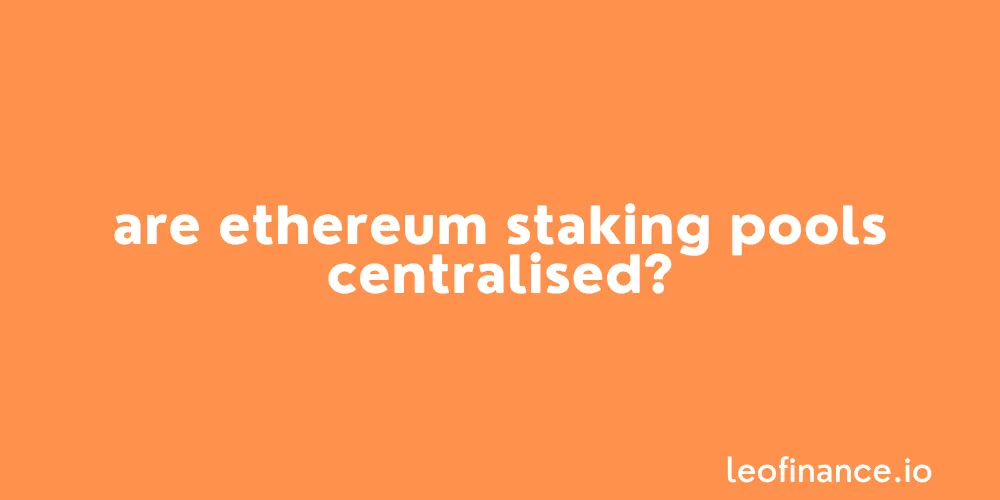
Direct from the desk of Dane Williams.
The centralisation risks of Ethereum staking pools are a real concern.
As we know, Ethereum (ETH) has successfully transitioned from the Proof of Work (PoW) consensus mechanism to Proof of Stake (PoS).
This new approach to consensus has brought with it a renewed focus on the potential for transaction censorship in Ethereum due to the centralisation of staking pools.
In case you missed it, Ethereum staking pools are a way for individual investors to participate in staking without having to own and maintain their own node.
But with a concentrated few owning the majority of stake, the reality is that the Ethereum network has been compromised.
In this blog post, I’ll explore the concept of Ethereum staking pools, the importance of decentralisation in the staking process and examine the concerns surrounding potential censorship.
What are Ethereum staking pools?
Staking pools are groups of individuals who combine their resources in order to participate in staking on a blockchain network.
In the case of Ethereum, staking pools involve combining the Ethereum holdings of multiple individuals in order to validate transactions and earn rewards.
By pooling their resources, individual investors can participate in staking without having to own and maintain their own node.
There are several benefits to staking in a pool.
For one, staking pools allow for smaller investors to participate in staking and earn rewards that they otherwise wouldn't be able to on their own.
Additionally, staking pools can help to distribute the risk associated with staking across multiple participants, rather than relying on a single node operator.
While allowing more people to participate sounds decentralised in theory, the reality of the situation is that they’re giving overall control to a select few.
According to Nansen, just 6 pools control over 70% of the ETH that has been staked.
Among these pools, Lido Finance is currently the largest, responsible for staking a whopping 31% of the entire amount of staked ETH.
While Lido provides an easy and convenient way for investors to participate in staking, its large share obviously poses a significant centralisation risk.
To make matters worse, several major exchanges such as Coinbase, Kraken and Binance also offer staking services and control a significant portion of the staked ETH.
If you’re not nervous about this concentration of power, then you probably should be.
Why is the decentralisation of Ethereum staking pools integral?
The decentralisation of Ethereum staking pools is integral for several reasons.
First and foremost, it helps to ensure that the network remains censorship-resistant.
When a small group of entities control a significant portion of the staked ETH, they have the power to censor transactions and even potentially manipulate the network.
For example, imagine a scenario in which a government or other centralised entity pressured a staking pool to censor transactions related to a particular group.
If the pool was controlled by a small number of entities, it could be vulnerable to this type of pressure and could potentially comply with the censorship request.
Would the major exchanges we talked about with a controlling stake of Ethereum comply with such censorship requests?
Of course they would.
However, if the network is more decentralised, with a larger number of staking pools controlling smaller portions of the staked ETH, it becomes much more difficult to censor transactions in this way.
Ethereum has been completely compromised and there’s no going back now.
Is Lido DAO’s size a centralisation risk?
Lido DAO is just as much of a risk as the exchanges when it comes to centralisation in Ethereum staking pools.
While Lido has become one of the most popular staking pools, with a significant portion of the staked ETH, questions have been raised about the risks associated with its size and governance structure.
One concern is the risk associated with the smart contract used by Lido.
As with any smart contract, there is always the potential for bugs or vulnerabilities that could be exploited by bad actors.
If a vulnerability was found in Lido's smart contract, it could potentially have disastrous consequences for the network.
Another concern is the question of Lido's own centralised governance structure.
While Lido is technically a DAO, or decentralised autonomous organisation, it is still ultimately controlled by a small group of individuals.
This has led some to question whether Lido can truly be considered decentralised and whether it is susceptible to the same risks as a centralised entity.
It's worth noting that Lido has taken steps to address some of these concerns, such as regularly auditing their smart contract and increasing transparency around their governance structure.
However, the fact remains that Lido's size and control over a significant portion of the staked ETH does present a massive external risk to the Ethereum network.
Final thoughts on the centralisation of Ethereum staking pools
The decentralisation of Ethereum staking pools is ultimately crucial for maintaining the integrity and security of the network.
As we've seen, centralisation in staking pools can lead to censorship risks and potential vulnerabilities.
While Lido DAO and other major staking pools have been successful in attracting a significant amount of staked ETH, questions remain about their size and governance structure.
While Lido has taken steps to address these concerns, the fact remains that any centralised control over a significant portion of the network poses risks to its decentralisation and security.
Moving forward, it will be important for the Ethereum community to continue exploring ways to mitigate these centralisation risks.
This could include supporting smaller staking pools, promoting transparency and better auditing governance structures.
Ultimately, the success of Ethereum and its transition to proof of stake will depend on the ability of the community to balance the benefits of staking in pools with the need for decentralisation and security.
Can it be done?
Best of probabilities to you.
Posted Using LeoFinance Beta
Return from Are Ethereum staking pools centralised? to forexbrokr's Web3 Blog

